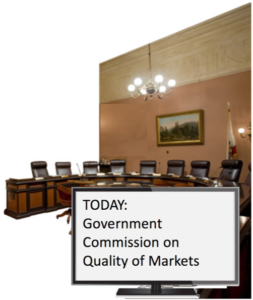 As times change, we hope to see a first country or region asking questions that can lead to a Modern Markets for All policy. Our experience with part of the vision in Europe and the US provides a roadmap.
As times change, we hope to see a first country or region asking questions that can lead to a Modern Markets for All policy. Our experience with part of the vision in Europe and the US provides a roadmap.
The time is right
Digital developments of the last two decades have reassigned trillions, undermined democracies, and driven social pressures to boiling. That has reshaped the window for acceptable technology policy. We needed that window to include:
- Questioning of current capitalism: When billionaires are renouncing the system that made them rich and 40% of adults see socialism as preferable to capitalism even in America, laisses faire policy on new markets is no longer unassailable.
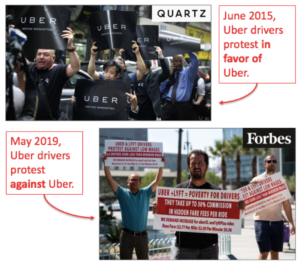 A Techlash: It seems like another era but, until recently, Silicon Valley behemoths were widely appreciated as innovators and agents of economic growth. This fueled a view they should be left to get on with digitizing the world, rather than suffer any sustained counterbalancing government vision for digital technology as a social enabler.
A Techlash: It seems like another era but, until recently, Silicon Valley behemoths were widely appreciated as innovators and agents of economic growth. This fueled a view they should be left to get on with digitizing the world, rather than suffer any sustained counterbalancing government vision for digital technology as a social enabler.
- Environmentalism in the mainstream: Better markets may seem tangential to climate concerns. But increasing awareness that consumption and travel have to diminish propels the case for localized, responsive, rental based, economies.
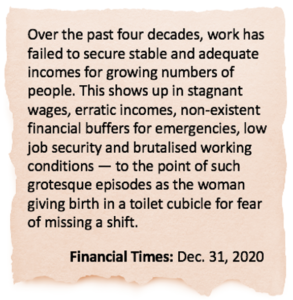 There’s another factor that hasn’t gained traction yet. In 2019, Uberworks was born in Chicago. In January 2020 it expanded to Miami with other cities promised. It’s Uber’s bid to shift from running ride-hailing to running a full labor market.
There’s another factor that hasn’t gained traction yet. In 2019, Uberworks was born in Chicago. In January 2020 it expanded to Miami with other cities promised. It’s Uber’s bid to shift from running ride-hailing to running a full labor market.
Like a lot that Uber does, this is on/off. We don’t know if they will replicate the anti-regulation, lowest pay, subsidized, growth formula that investors loved in their ride-hailing operations. But Uber’s possible expansion into general labor markets should focus minds around the world.
Establishing an organization
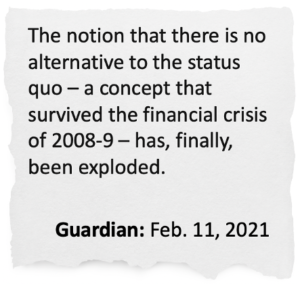 We aim to set up a formal organization, the Modern Markets for All Foundation. Mission Statement: “We work towards everyone in the world being able to sell their skills and assets in the best markets now possible”. That journey requires three key strands of work:
We aim to set up a formal organization, the Modern Markets for All Foundation. Mission Statement: “We work towards everyone in the world being able to sell their skills and assets in the best markets now possible”. That journey requires three key strands of work:
- Marketing: The mechanics of current market inequality need profile and scrutiny. We have worked with commentators around the world to deliver this on our gig work operations.
- Sales: Countries and regions must be prompted to explore a public option for online markets. Big Finance also need outreach. We want them to fund for everyone else what they developed for themselves; state-of-the-art markets.
- Product development: Sophisticated – but easy to use – software to drive these markets needs to be continuously developed, tested, used, and refined. The brains and resources in big tech companies could help enormously.

We see our organization as a non-profit, dedicated to open sourcing its outputs. Here’s why. Our model is the Linux Foundation. Turning over $80m a year it has enabled others to build huge reseller businesses. But the Foundation is a neutral, stable, credible, advocate, and arbiter of the code.
Healthy markets require more than tech. We have to guard against not just bad code but inadequate institutions on which the markets depend (courts, identity checking, licencing). We can be neutral assessors, regularly ranking installations against a ten point checklist that ensures best possible markets under local control. This function is comparable to the way Mastercard or Visa award their coveted badges only to card issuers meeting their standards.
And, if we are to take our mission statement seriously, there’s a possibility of having to operate markets directly. It’s obviously undesirable to act as one of the regulators and an operator. The arrangement should only ever be temporary. But if we believe even people in occupied territories, disputed lands, failed states, or warzones are entitled to the best markets now possible, we have to accept serving them may not be a commercial opportunity. It could be there is no-one else qualified and motivated to offer a platform locally.
Ready for the rough
No serious policy proposal should aspire to an easy ride. Our plans and operations should be scrutinized, scrubbed of messy thinking, and confronted from a range of viewpoints. But, we have years of experience in government innovation and have observed the fate of other policy entrepreneurs. It’s naïve to think we will encounter only productive, intellectual, challenges.
We anticipate:
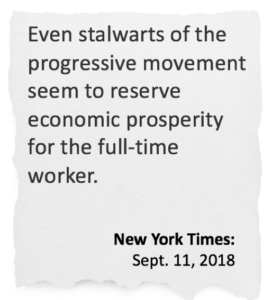 Paralysis by Analysis: Even the most dynamic philanthropies and public bodies can struggle to grasp the extent of fluid economic activity. Even when they do, managers can be cautious about getting ahead of the curve on economic changes for fear of wasting precious resources.
Paralysis by Analysis: Even the most dynamic philanthropies and public bodies can struggle to grasp the extent of fluid economic activity. Even when they do, managers can be cautious about getting ahead of the curve on economic changes for fear of wasting precious resources.
But there comes a point where commissioning more research, or waiting for trends to become clear, allows problems to worsen. Meanwhile solutions that may not be perfect, but are a start, wither from lack of interest. Funders’ exclusive focus on job creation is a problem.
- Language hijacking: If our marketing plan succeeds, expect to see terms like “public option for markets”, “Modern Markets for All” and “POEMs” bandied by people with no commitment to the principles we are trying to embed in those terms. The second two terms were effectively virginal when we coined them.
 Inflammatory issues: Early railway acts were hindered by a view from religious leaders that smoking, sparking, locomotives roaring through the countryside would summon the devil. We will experience these kinds of emotional hooks applied to some aspect of our plans.
Inflammatory issues: Early railway acts were hindered by a view from religious leaders that smoking, sparking, locomotives roaring through the countryside would summon the devil. We will experience these kinds of emotional hooks applied to some aspect of our plans.
- Watering down: Early implementations of POEMs will likely be subtly limited by governments to protect vested interests. It could be the only way to navigate passage of legislation. But if public interest is aroused, expect further jurisdictions to be more assertive about ensuring their citizens have unbridled access to Modern Markets.
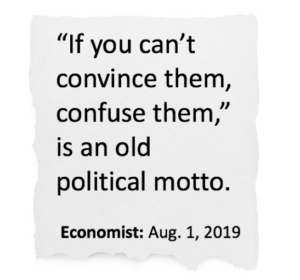 The complication underlying all this is; there isn’t a natural constituency for Modern Markets for All. It fits either side of the aisle. Our opposition will likely be shape-shifting. If POEMs looks set to become reality, watch out for astroturf operations set up by platform companies. Or anticipate operations such as Monsanto’s “intelligence fusion center” which has monitored pesticide campaigners.
The complication underlying all this is; there isn’t a natural constituency for Modern Markets for All. It fits either side of the aisle. Our opposition will likely be shape-shifting. If POEMs looks set to become reality, watch out for astroturf operations set up by platform companies. Or anticipate operations such as Monsanto’s “intelligence fusion center” which has monitored pesticide campaigners.
Our strategy
Preparing for a publicly-minded infrastructure campaign in the era of fake news, polarizing content filters, and global provocateurs seems to call for some key precautions:
- Financial sustainability: We have to build a base of donors who robustly support us, possibly because they see commercial opportunity in exploiting our open source tech.
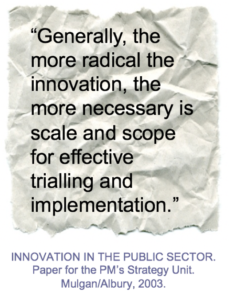 Resisting small scale launches: We have seen this in our projects around gig-work markets. You can’t change the system by starting in the smallest increments. We can launch POEMs in small territories but only with big resources. Temptation to try proving our case with inadequate tools is setting ourselves up to fail.
Resisting small scale launches: We have seen this in our projects around gig-work markets. You can’t change the system by starting in the smallest increments. We can launch POEMs in small territories but only with big resources. Temptation to try proving our case with inadequate tools is setting ourselves up to fail.
- Independence: We have to be aggressively apolitical. If all the enthusiasm comes from one end of the political spectrum, that’s where we work. But we are open to anyone who accepts the principles to which we are committed and can move the dial on our mission.
- Casting the net wide: We won’t focus narrowly on one or two territories and try to launch POEMs there. That risks being impaled on political changes or internal missteps. Instead, we aim to engage multiple international economic development bodies then talk to as many countries/regions as we can. A hotlist of our top ten most promising jurisdictions can be published monthly with any government on it prone to being bumped down if there’s more action towards legislation elsewhere.
- Enabling self-help: We aim to have a webhub which shares learning, connects open source developers, and empowers anyone aiming to be a policy entrepreneur in their country. If you want to see POEMs happen where you live and are realistic about working through thinktanks, political advisors, and media for a couple of years; we aim to give you every document you will need for local adaptation. When a politician decides to commission an exploratory project, our website will offer a manual with suggested steps.
- Telling our own story: Setting out to reset world capitalism is exciting. There will be mistakes, misapprehensions, and mischaracterization. We should generate lively vblogs, articles, and earned media that turns it all into an awareness raising narrative.
And even before any launches, our Foundation has to live by the principles POEMs demands; transparency, fairness, and sharing of data while protecting individual parties’ privacy.
Where does it start?
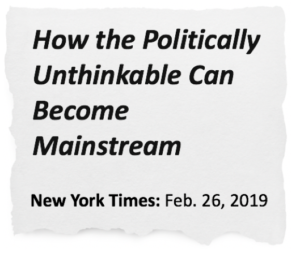 We have fledgling markets for hourly labor operating in the US. Continuing to develop that technology and learning underpins a wider journey to equitable markets that can start as the required resources are found. It won’t be easy. But enormous social good could flow from governments just asking the question: “Do local people and businesses have access to the best markets now possible?” Findings can inform thinking on a range of social solutions.
We have fledgling markets for hourly labor operating in the US. Continuing to develop that technology and learning underpins a wider journey to equitable markets that can start as the required resources are found. It won’t be easy. But enormous social good could flow from governments just asking the question: “Do local people and businesses have access to the best markets now possible?” Findings can inform thinking on a range of social solutions.
We are looking for leaders who see first mover advantage for their firm, institution, or government from working with us. They will be driven by a range of factors; pragmatic, partisan, principled, or prescient. But support for these pioneers – while ensuring each continues to merit a place on our competitive “Movers list‘ – will quickly deepen our understanding of how to best deliver the mission.
 Immediate outcomes our team could pursue include: Who at the World Bank might scrutinize the possibilities of public official e-markets? Which of the world’s Ministries for Innovation will be most receptive? Is a US Presidential Study Directive a possibility? If not, could policy analysts likely to advise presidential candidates be induced to consider making Modern Markets for All a commitment? How easily could India’s Aadhaar digital-identity system evolve into POEMs? Which British Members of Parliament might be sympathetic to a post-Brexit private member’s bill? History suggests better markets initiated by policymakers are inevitable; the gap between what is possible with these technologies and what we have is so great. But astute tactics would bring them forward.
Immediate outcomes our team could pursue include: Who at the World Bank might scrutinize the possibilities of public official e-markets? Which of the world’s Ministries for Innovation will be most receptive? Is a US Presidential Study Directive a possibility? If not, could policy analysts likely to advise presidential candidates be induced to consider making Modern Markets for All a commitment? How easily could India’s Aadhaar digital-identity system evolve into POEMs? Which British Members of Parliament might be sympathetic to a post-Brexit private member’s bill? History suggests better markets initiated by policymakers are inevitable; the gap between what is possible with these technologies and what we have is so great. But astute tactics would bring them forward.
